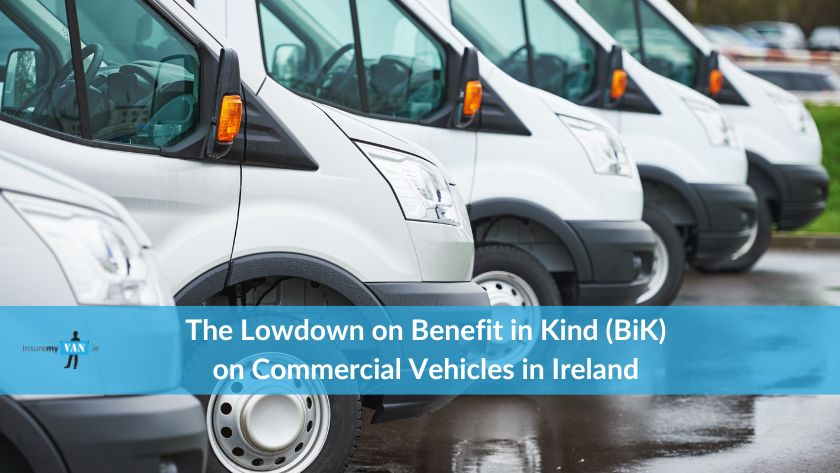Guides & Tips
The Lowdown on Benefit in Kind (BiK) on Commercial Vehicles in Ireland
Understanding BiK on commercial vehicles is crucial for businesses in Ireland. It impacts how companies provide vehicles to employees and the tax implications of these benefits. As of 2023, changes in taxation rules in Ireland are affecting how Benefit in Kind (BiK) is calculated for both commercial vehicles, with specific considerations for electric vehicles. In this guide, we break down these changes and what they mean for businesses. For more information on how this might affect your company and how commercial insurance can play a role in managing these changes, keep reading.
Understanding Benefit in Kind (BiK)
Benefit in Kind (BiK) is a concept in the world of business that every employer should be familiar with. It essentially represents non-cash benefits or perks that an employer provides to employees in addition to their regular salary. These perks can take various forms, ranging from extra vacation days and professional development opportunities to tangible items like company vehicles, smartphones, laptops etc. As a business owner, grasping the ins and outs of BiK, especially when it involves commercial vehicles, is crucial. It has implications for the taxes that both your business and employees are obligated to pay.

BiK on Company Cars
First up, company cars provided to employees can trigger BiK tax. What’s interesting is that the tax amount depends on the car’s CO2 emissions and how many business miles it covers.
Now, here’s the big change for 2023: the BiK calculation for company cars factors in both CO2 emissions and business miles. The number of business miles falls into different groups, each with a specific tax percentage based on the car’s CO2 emissions.
As well as this, there have been changes to how you can calculate your Benefit in Kind (BiK) liability. The good news is, it could mean lighter tax responsibilities for your business. When determining the BiK liability, employers can now reduce the original market value of commercial cars, vans, and electric vehicles (EVs) by an additional €10,000.
BiK Categories
Revenue.ie has outlined the vehicle categories based on their emissions and mileage to determine the applicable percentage of rax relief:

Example for Company Cars
Let’s break it down. Say an employee gets a company car valued at €30,000. The car has CO2 emissions of 85g/km, landing it in “Category B.” During the year, the employee drives 35,000 business miles, which falls within the 26,001-to-39,000-kilometre category. Due to the new tax relief of €10,000 the value of the car can be reduced from €30,000 to €20,000
So, the BiK calculation for this company car goes like this:
Cash Equivalent (Open market value) €20,000 x 21% = €4,200
To handle the tax correctly, employers need to keep records of how much employees drive for business. This info should be regularly updated, ideally every month, and used for calculating BiK when reporting payroll returns. It’s a good idea to consult with an online accountants to assist you with your business taxation.
Special Considerations for Electric Vehicles
Now, let’s talk about electric vehicles. With these becoming more popular, tax rules are changing too.
Electric vans and cars come with an exciting tax benefit. From 2023 to 2025, the tax you’ll need to pay for an electric vehicle made available for employees’ private use is calculated based on the original market value (OMV) of the vehicle, with a deduction. The deduction is:
€45,000 for vehicles provided in 2023.
€20,000 for vehicles provided in 2024.
€10,000 for vehicles provided in 2025.
If this deduction brings the OMV down to zero, there won’t be any tax charges. But if there’s any amount left after the deduction, that will be subject to benefit-in-kind (BIK) tax at standard rates. This is a friendly move to promote electric vehicles, making them a more tax-efficient choice. With that in mind, it’s a good idea to consider going electric with your company vehicles.

In a nutshell, these new BiK rules apply to all types of business vehicles, from cars, vans and jeeps to electric vehicles. It might seem like a lot, but understanding the rules and keeping proper records can save businesses from unexpected tax costs.
At InsureMyVan.ie, we know that running a business is challenging, and insurance shouldn’t add to the complexity. We offer commercial van insurance solutions designed to protect your business assets and help you focus on what you do best. Whether you’re a small business with one vehicle or you have a whole fleet, we’re here to help. Check out our website for more information and explore your options.


